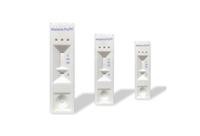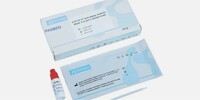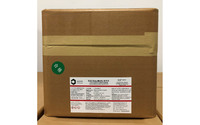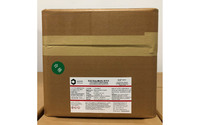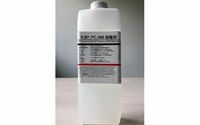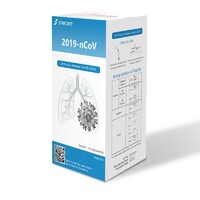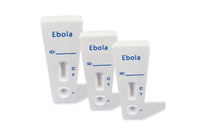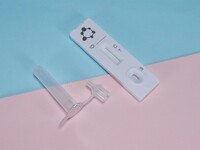Dengue virus is an enveloped, single-stranded, positive-sense RNA virus that comprises four related but distinct serotypes (Den 1, 2, 3, and 4). The virus is transmitted by mosquitoes of the
daytime-biting Stegomyia family, principally Aedes aegypti and Aedes albopictus. Today, more than 2.5 billion people living in the areas of tropical Asia, Africa, Australia and the Americas are at
risk for dengue infection. Contact us for more dengue ns1 price info!
An estimated 100 million cases of dengue fever and 250,000 cases of life-threatening dengue hemorrhagic fever occur annually on a worldwide basis. Serological detection is a common method for the
diagnosis of infection with dengue virus. IgM anti-dengue virus starts to appear at 3 days after initial exposure and remains in circulation for about 30-60 days. IgG anti-dengue virus is raised at
around 7 days, peaks at 2-3 weeks and persists for the duration of life4-6. Detection of antigens released during virus replication in the infected patient show very promising results; it enables
diagnosis from the first day after the onset of fever up to day 9 once the clinical phase of the disease is over, thus, allowing early detection and prompt treatment. If you want to learn more
details about the in vitro diagnostic rapid test, please contact us.
Dengue Test Kit Procedure
For qualitative rapid detection of dengue virus IgM and IgG antibodies in human serum, plasma or whole blood. Can be used in clinical laboratories to test results within 15 minutes in patients with
persistent fever and dengue symptoms.
Dengue Test Kit Results
1. It is used for qualitative rapid detection of dengue virus IgM and IgG antibodies in human serum, plasma or whole blood. Results can be detected within 15 minutes.
2. It is used to qualitatively detect the IgM antibody of dengue virus in the serum of the population, and it is used for the auxiliary diagnosis of patients with dengue fever symptoms with
persistent fever in clinical laboratories.
3. For qualitative detection of IgG antibodies against dengue virus (serotypes 1, 2, 3 and 4) in serum. It is used for auxiliary diagnosis of secondary dengue infection in clinical laboratory.
4. For qualitative detection of dengue virus NS1 antigen (serotypes 1, 2, 3 and 4) in serum. It is used for the auxiliary diagnosis of dengue fever patients with persistent fever in clinical
laboratory.
5. For qualitative detection of IgG antibodies against dengue virus (serotypes 1, 2, 3 and 4) in serum, for clinical laboratory auxiliary diagnosis of patients with persistent fever and dengue
infection symptoms or contact history .
6. For qualitative detection of dengue virus IgM and IgG antibodies in serum. A primary infection can be distinguished from a secondary infection.
Application Of Dengue Fever Test Kit
1. For the detection of dengue virus secondary infection.
2. For the diagnosis of active dengue virus infection.
3. For the diagnosis of dengue virus endemic areas.
4. It can be used 2-5 days after the onset of the disease.
Features Of dengue ns1 kit
The Dengue Ag NS1-IgM/IgG rapid test detects IgG and IgM anti-dengue virus and circulating dengue antigen in one test within 20 minutes. This dengue rapid test kit is user-friendly, does not
require cumbersome laboratory equipment and requires minimal staff training.
The Dengue NS1+IgM/IgG Combo rapid test is a lateral flow immunoassay for the simultaneous detection and differentiation of IgG anti– dengue virus, IgM anti-dengue virus and dengue antigen (Dengue
Ag) in human serum, plasma or whole blood. It is intended to be used by professionals as a screening test and as an aid in the diagnosis of infection with dengue virus. Any reactive specimen with
the Dengue Ag NS1-IgM/IgG rapid test must be confirmed with alternative testing method(s).
Precautions Of dengue duo rapid test kit
1. For in vitro diagnostic use and professional use only.
2. Read the package insert instruction before use the kit.
3. Do not use beyond the expiration date which appears on the package label.
4. Do not open the sealed pouch, unless ready to conduct the assay
5. Bring all reagents to room temperature (15°C-30°C) before use.
6. Haemolized blood may be used for the testing, but do not take precipitants.
7. Wear protective clothing and disposable gloves while assaying samples. Wash hands thoroughly after performing the test.
8. Handle all specimens as if they contain infectious agents. When the assay procedure is completed, dispose of specimens carefully after autoclaving them for at least one hour. Alternatively, they
can be treated with 0.5 to 1% solution of sodium hypochlorite for one hour before disposal.
9. Do not smoke, drink, or eat in areas where specimens or kit reagents are being handled.
10. Read result after 30 minutes may give erroneous results.
11. Do not perform the test in a room with strong air flow, an electric fan or strong air-conditioning.
12. As with all diagnostic tests, a definitive clinical diagnosis should not be based on the results of a single test, but should only be made by the physician after all clinical and laboratory
findings have been evaluated.
13.Excess sample volume (>5µL) can give false positives
As the most professional ivd study company, we provide dengue duo kit, in vitro diagnostic products and etc. If you want to know more detail about in vitro diagnostics market or buy dengue test
kit, please contact us.


